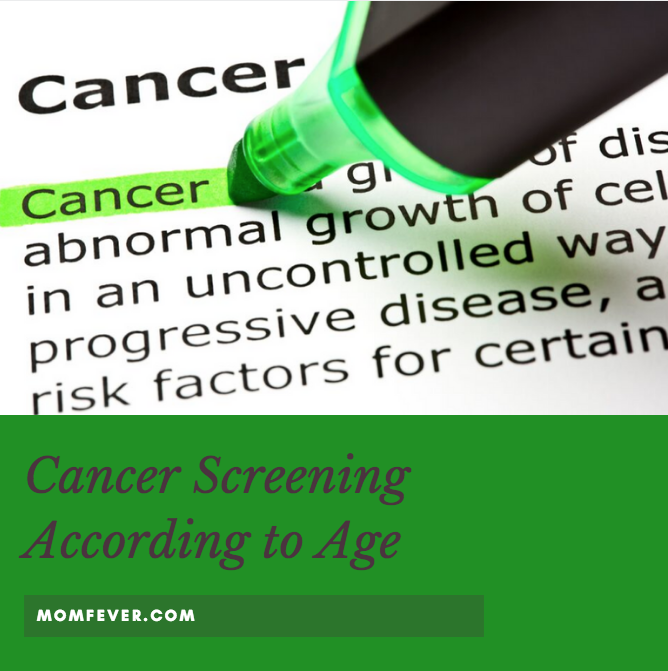Cancer Screening According to Age
Even though I find it unpleasant, I always take care to go in for my pap smear. Because I know it's important. And could potentially be live saving.
Cancer is scary.
So whatever I can do to avoid it, I will.
So I was very happy when Imran offered to share information about the things you can do to at least minimize the risks of getting cancer.
Cancer Screening According to Age
Cancer is among the deadliest diseases of modern times. Even though the cancer mortality has dropped significantly over the past 30 years, it is still a very dangerous and prevalent disease. A lot of money and effort is put into various cancer treatments and medication.
Even though developing cancer treatment is important, we can’t all do it. What we can do is minimize the risk of contracting cancer in the first place. That means adopting healthy habits and lifestyle, as well as going to regular cancer screenings.
Cancer screenings can help your doctor detect some types of cancer early on and treat them before they can do any real damage. Depending on your age, your gender as well as on your lifestyle, there are some cancers which are much more likely to afflict you.
In Your Twenties
Most of us are in great health in our twenties and we can weather most illnesses without much problem. However, when it comes to cancer, it is important to be serious about it and to realize just how dangerous it can be.
Women in their twenties need to pay special attention to their breasts, as breast cancer is one of the most common and deadliest cancers for women. You should know what your breasts look like and feel like normally, so you can report any changes to your doctor as soon as possible. If you don’t all into a category of higher risk of breast cancer, you likely do not need to have any additional testing done.
Cervical cancer is another type of this illness which can manifest itself around this age. Experts recommend having the first Pap testing at the age of 21 and then every 3 years after that, whereas additional testing should only be done if the Pap test comes in abnormal.
Men and women in their 20s should find out whether they have a heightened risk of colon cancer and have regular screenings if that is the case. If not, no further testing is needed in your twenties.
In Your Thirties
A lot changes in your thirties, and so does the risk of having cancer. For men, the risk of colon cancer increases, so anyone with an average risk of colon cancer needs to pay attention to their diet, as well as have regular screenings.
When it comes to women, all the same cancer types are important to pay attention to – breast, cervical and colon. However, when it comes to breast cancer, you should start having mammogram testing even if your risk of breast cancer is average.
In Your Forties
In their mid-forties, some men start being at a higher risk of prostate cancer. That means that testing for this illness is a good idea, especially if you have at least one close relative who has or had this illness before they were 45.
Colon cancer risk also increases for men; with many different tests available, you should consult your doctor about which one suits you the best and have it done regularly, as agreed with your doctor.
When it comes to women, mammograms should be an annual checkup after the age of 45, but you can decide to start earlier if you wish. Cervical and colon cancers are still an issue, but just like in the thirties, the regular checkups should give you plenty of warning if any of these illnesses is detected.
In Your Fifties and Older
For men, all the same cancers are to be tested, but also lung cancer, especially for smokers. Even if there are no signs or symptoms of lung problems, there is still a chance that this illness is hiding. However, keep in mind that not all insurance companies want to cover this kind of screening, especially if there are no symptoms.
Women should also get lung cancer screenings around this age, especially if they are or were smokers. All the other cancers should be continually monitored, except mammograms can be reduced to once every two years, since the likelihood of breast cancer diminishes somewhat at this age.
These screenings are recommended by the American Cancer Society for people with no symptoms and no heightened risk of cancer. Naturally, if you have any ailment, you should consult your doctor and have yourself tested for other types of cancer as well.
Make sure you don't miss any posts on Momfever!
Enter your email address:
Delivered by FeedBurner

